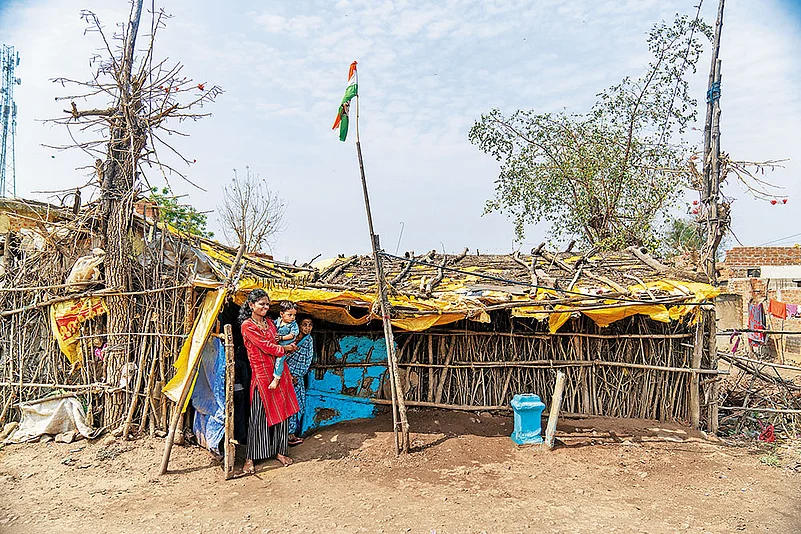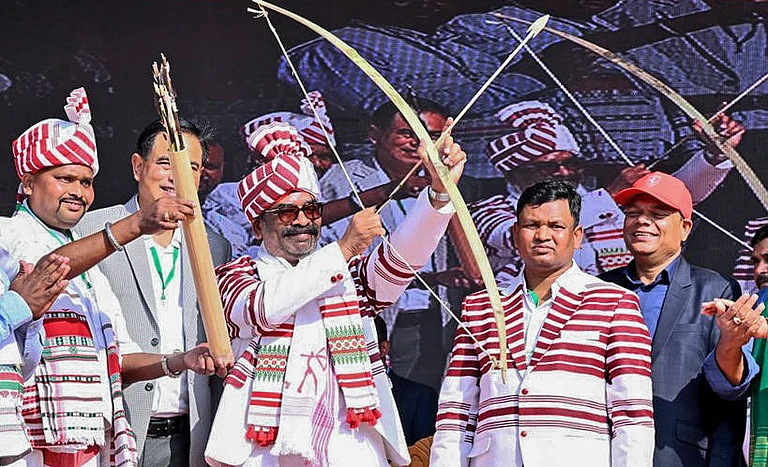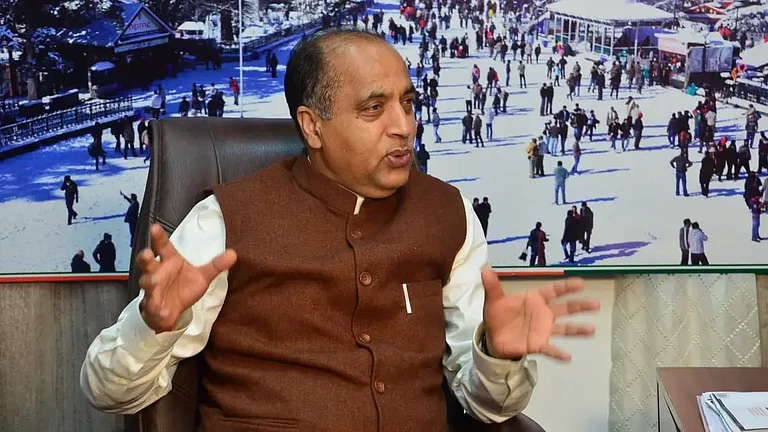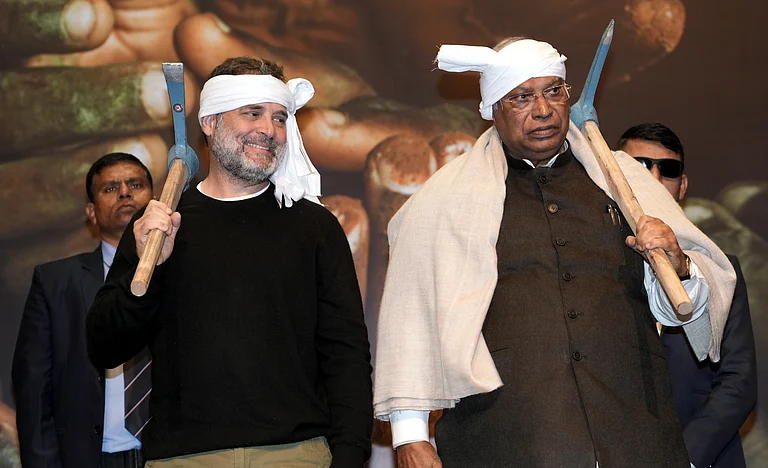After passing through the hilly terrains of the Maharashtra-Madhya Pradesh border, as one reaches Saikheda village in Chhindwara district of Madhya Pradesh, a cluster of mud houses covered with dried leaves and ripped tarpaulins take you back in time. The Lok Sabha elections are round the corner, but there is hardly any buzz. For the 80 families belonging to the Gond Adivasi communities living in the cluster, elections or voting rights are nothing but ‘political rhetoric’. For them, it is just ‘another time’ they have to stand in a queue to cast their votes.
“Do we have to vote again? We did a few months back,” asks Rani Inwati, in her late 20s. Pointing at the torn roof from where water sometimes drips and keeps them awake at night, she says: “Nothing has changed and nothing will.”
Rani is making rotis for her two sons—one is nine, and the other is five. A few lid-less water buckets are kept beside a rickety plastic chair on which a few ragged clothes are dumped. In that single-room kitchen setup, one could find only a bottle of mustard oil and a small plastic container of salt. While shooing away the cockroach that was approaching the plate full of rotis, Rani asks: “What should I serve him with roti? There is only salt.”
Rani’s husband is standing outside. A severely malnourished Tikuram resembles a skeletal structure. “We get the monthly ration but that is not sufficient,” he says. He is referring to the much-propagated Pradhan Mantri Garib Kalyan Anna Yojana through which 81 crore poor people across the country receive five kgs of food grains every month. The government recently extended the scheme for another five years.

A few steps away from Rani’s house, Sukhu Maravi is pulling out a bucket of water from a deep well that serves as one of the major water sources in this village. As she continues with the strenuous job, Radi Kumre points to the yellow pipe that encircles the dry tap. “Every 8-10 days, water comes here from a nearby tank and we have to fill our buckets. This is our drinking water.” They are charged Rs 50 per month for this water by the village Panchayat. The water tank of 1 lakh litre capacity was made by Kamal Nath when he became the Chief Minister of the state for 15 months, another villager adds. However, no tap of Jal Jeevan Mission has yet been laid in the village, says Kumre. The data from the dashboard of Jal Jeevan Mission—PM Modi’s pet project that was started in August, 2019—shows that almost 62 per cent of Chhindwara district has already received water connection. “Actually, no central scheme works here as it is an opposition constituency,” says another villager. “This is not our fault”.
The Lok Sabha elections have kickstarted, but there is hardly any buzz in the Adivasi pockets of MP.
Saikheda is a part of the Chhindwara constituency that is known as Congress leader Kamal Nath’s bastion. In the last 45 years, barring once in 1997, nobody except Nath or Nath’s family members has won from this constituency. In the 2019 Lok Sabha elections, when the BJP swept away the state winning 28 out of 29 constituencies, they couldn’t make a dent in Chhindwara. With almost 37 per cent Adivasi population, this seat is cited by the Congress leaders as an example of development. The BJP is desperate to win the seat this time.
“Just after three days of winning the assembly elections (last year), Shivraj Singh Chouhan visited the constituency and talked about ‘Mission 29’. Mohan Yadav, the current Chief Minister, has also come here at least five times since he became the CM in November,” says a district-level BJP leader. Recently, BJP President J P Nadda addressed a huge rally in Chhindwara city and on April 16 Home Minister Amit Shah arrived for a roadshow ahead of the first phase of polling on April 19.
Notably, several senior Congress leaders from the district, including former MLA Deepak Saxena, current MLA Kamalesh Shah, and Vikram Ahakey, the mayor of Chhindwara, have already jumped the boat and joined the BJP. The leaders of the BJP claim that almost 12,000 Congress leaders have joined their party in the last four months. Chhindwara was scheduled to go to the polls on April 19, along with another five Adivasi-dominated seats— Balaghat, Mandla, Sidhi, Shahdol and Jabalpur.

However, this political contest is trivial for most of the villagers. Showing their mud houses that barely have stable roofs, Rajendra Maravi from Saikheda village says: “Most of them haven’t received anything under the Pradhan Mantri Awas Yojana. You have to be a “their” voter to get these facilities. Our names don’t appear on the list.”
There are a few houses made of bricks and cement. “These belong to “their” workers,” Maravi adds. Most of the villagers here don’t have more than two acres of land, they point out. “Large-scale lands are owned by the Kunbi community,” says Rinku Inwati who had just come back from a nearby rally of Kamal Nath’s son Nakul Nath who is fighting for his second stint.
“This time, due to the untimely rain, we suffered a lot. We had to use a harvester machine to reap the wheat. But the Sarkari Samiti doesn’t give us a proper price for that and thus we have to sell it to the private players.”
The Nath scion came in a chopper amidst much fanfare and flew away after staying for an hour in the village. In the rally that was attended by around 250 people, Nath promised jobs and spoke about what his father did in the last four decades for the constituency. His white kurta pajama glowing in the April sun against his humble audience takes a leap back to the days of fiefdom when zamindars used to come in open jeeps to visit villages. The difference now is that jeeps have been replaced with choppers. Notably, Nath is the richest candidate in the state with a declared wealth of Rs 716 crore. His conspicuous silence on the basic demands of villagers—like a pakka ghar, a high school or a well-equipped health centre—probably shows the gap between the chopper and the ground.
As a few children run behind Nath’s convoy to have a glimpse of the chopper and look up as it ascends from the ground, Maravi sighs: “Where will these kids go after class 8? Those who have money can send their children to Chicholi, around 30 km away. But the rest can’t. So, the children don’t continue their studies.”
The fact that Kamal Nath’s bastion—that he has held onto for the past 45 years—does not have operational high schools, hospitals or pucca houses in the interior villages has given the BJP a poll plank that ‘Bunty Bhaiya’ is banking on and is looking to snatch the seat from the Nath family.
“What can Kamal Nath do? He made a health centre, a vet hospital, built concrete roads, a water tank, and schools but nothing is operational as the state governments don’t have the intent to maintain these facilities,” says a bemused Congress supporter and village veteran. For him, the main issue is the minimum support price (MSP) of cotton. “They promised to give Rs 10,000 per quintal but what we are getting is Rs 6,600. This is just unacceptable.” At the rally, Nath even mentioned the MSP for cotton and reiterated the promise made by the party to pass an MSP law if it comes to power.
***
The issue of MSP is not limited to the Adivasis of Saikheda. Around 100 km away, at Sagoniya village in Amarwada segment of Chhindwara constituency, farmers are suffering both due to climate change and the MSP of the crops—mostly wheat.
Sonu Dahariya, a young farmer, while walking through his land where he is yet to sow chickpeas and corn, says: “This time, due to the untimely rain, we suffered a lot. We had to use a harvester machine to reap the wheat. But the Sarkari Samiti doesn’t give us a proper price for that and thus we have to sell it to the private players.”

The machine-cut wheat has some residue that affects the quality of the wheat, says another farmer. So, the government doesn’t want to take it. “These residues are not there when cut manually. But we don’t have labourers here to do it. They get Rs 200 per day in MP whereas they get Rs 900 in Kerala,” he adds. This is the major reason why most of the labourers have left for different states.
The only reasonable thing that they could opt for is the private market. Ravinder Dahariya, another farmer while explaining the limitations of the private market, says, “They pay Rs 2,100 per quintal but from the government, we can get Rs 2,400 per quintal,” says Ravinder. Notably, the BJP promised Rs 2,700 per quintal MSP for wheat prior to the 2023 assembly elections.
This year, Sonu harvested 100 quintals of wheat that are stacked in sacks in the small courtyard of his house where his old father Ayodhya Prasad, a long-time aide of the Congress, idly sits on a chair and explains the crisis. “A difference of Rs 300 per quintal (between the government price and the price set by private dealers) amounts to a loss of Rs 30,000 for 100 quintals. And moreover, the government is not even giving promised prices.”
There are other issues in selling the crops in the government market as well. “You have to wait for a long time for your turn to come and in between if it rains and your crops get spoiled, you don’t get the right price,” says Sonu.
Against the backdrop of climate change, the storage of grains has become a major issue. The cold storages charge them around Rs 100-150 per quintal grain for a month. To store and safeguard 100 quintals of wheat from rains, one must pay at least Rs 10,000—not a small amount for farmers, says Sonu. The unexpected rains have made the condition worse, he adds.
Kuru Inwati, an Adivasi resident of the same village, however, has different reasons for selling his crops to private players. Standing near his mud house—in front of which he has spread Mahua to dry—Inwati says: “We take money from private players. Thus, we have the compulsion to sell it to the moneylenders only.”
The farmers are not getting the promised MSP for paddy as well, notes Ghanashyam Sandodiya, a Zila Panchayat member of Seoni district. “They promised to give Rs 3,100 per quintal for paddy but still, they are paying Rs 2,125.” For 100 quintals of paddy, the difference between the promised and given price is almost 1 lakh. “How can one believe them?” asks Sandodiya. As per government data, the MSP of paddy in the 2023-24 season stands at Rs 2,183 per quintal for common quality and Rs 2,203 for grade ‘A’ quality.
***
While the farmers are suffering due to their compulsion to sell wheat to the private players, a few of them are compelled to do farming as there are no job opportunities. Pushpendra Dahariya, who is in his early 20s, finished his post-graduation in Mathematics. After that, he filled up recruitment forms for government exams but couldn’t crack any. “I also applied for the post of patwari but later got to know that there was a scam in recruitment,” he adds.
Last year, a serious controversy regarding the patwari recruitment came out when it was found that seven out of the 10 in the merit list were from the same examination centre. Interestingly, the college was allegedly run by a BJP MLA. While 9.8 lakh people appeared in the examination, only 9,000 could make it to the final list.

In the last twenty years, Madhya Pradesh witnessed several recruitment scams. In 2013, the medical exam scam became an electoral issue and the whistleblower Dr Anant Rai was arrested. Later, Rai, along with several other Adivasi leaders, formed the Jay Adivasi Yuva Shakti (JAYS) that gradually became a formidable political force in Malwa Nimar—the western part of the state. Before Vyapam, there were scams in police recruitment as well, says Sonu. “In 2011, I passed the physical round but thereafter didn’t hear from them. Later I got to know that you need connections to get any government job.”
The exam scams and paper leaks have become one of the major electoral issues this year as well. Both parties have promised to bring a law to stop paper leaks. While evoking the issue of unemployment, Nakul Nath said at most of his rallies across different villages in Chhindwara: “Kamal Nath created the Borgaon industrial area where at least 10,000 people from the constituency are now working. The Congress stands for employment while the BJP gives false hopes and promises.”
There are many like Sonu and Pushpendra who, despite completing their graduation or post-graduation, are working as farmers in the Adivasi-dominated Seoni district as well. Satyendra Uikey and his wife Nirmala Uikey— residents of Kandipara village in Seoni district—finished their post-graduation years ago. While Satyendra has a degree in geography, Nirmala pursued sociology.
“Both of us have B.Ed. as well. Last year, we applied for teaching jobs in grade I, II and III. We couldn’t make it. There were 11,500 seats for STs (Scheduled Tribes) but they left 4,500 seats vacant.” In the MP TET, the teacher recruitment exams that the Uikeys are referring to, SC/ST candidates need to get 82 marks out of 150 to qualify. Otherwise, the reserved seats are left vacant. Recently, when Rahul Gandhi visited Madhya Pradesh with his Bharat Jodo Nyay Yatra, he referred to unemployment as the major issue of the state. In its manifesto, the Congress has promised to give Rs 1 lakh to youths for one year along with an apprenticeship so that they could be easily integrated into the job market.
***
Around 25 km away from Kandipara, at Karkotikhapa village—a part of Balaghat constituency where the BJP has fielded Bharti Pardhi, a new face, and dropped sitting MP Dhal Singh Bisen—MSP and unemployment are not the only concerns. They are in a tricky place where the ‘lives of tigers are valued more than humans’, says a villager.
Bordering Pench National Park—one of the major tiger reserves in India—the villagers living in the buffer zones have to face issues like cattle being attacked or taken away by tigers or villagers losing their lives due to tiger attacks. “This happens every day. In the past one year, more than 10 people have been taken away by tigers. But animals are more precious than us,” says Kishore Taikam.
In 2023, when one of the villagers, Pancham Uikey, was killed by a tiger, they protested and blocked the road. “We demanded that at least Rs 8 lakh compensation be given to his family, along with a government job. But what we received were cases slapped against us for protesting,” says Ramdayal Uikey. “Pancham lost his mother last year and then his father died out of trauma,” says Taikam.
In the 2019 Lok Sabha polls, when the BJP swept away the state winning 28 out of 29 constituencies, they couldn’t make a dent in Chhindwara.
Though the villagers have been asking for fencing, it has not yet materialised. Instead, losing cattle has become an everyday reality. Ramkali Masaram, a villager of Yatarvani village, recalls: “Tigers took away my four buffaloes. I asked for at least Rs 10,000 compensation for each. But what I got was Rs 4,000 per buffalo.” While fencing is a far-fetched dream for them, they fear that Karmajhiri village would soon be evacuated as the government wants it to make a buffer zone. The village has a population of 245 people, as per the 2011 census. “They will have to migrate soon,” says Uikey.
On the one hand, people are unable to go to the jungle to get forest resources, and on the other, their land is being taken away by the sand miners, point out Golu, who is an activist of Birsa Brigade, an Adivasi organisation that has been mobilising the indigenous communities for their rights in Maharashtra and MP since 1995. A local leader explains the process. “As they cannot directly buy Adivasi lands, they do it through a dalal who is also Adivasi. Then he takes permission from the district collector to sell it to a non-Adivasi person. This has become a land-grabbing chain now.”
However, the tiger issue didn’t come up in the election campaign in Balaghat. “Neither the Congress nor the BJP is taking this up,” says a villager. Instead, while addressing an election rally just 20 km away from this area, former CM and the senior BJP leader Shivraj Singh Chouhan evokes the issue of Ram Mandir and asks people to vote in the name of Ram and Modi.
***
On the ground, Ram is everywhere and no political party can certainly claim him, says Rajendra Dahariya, a resident of Amarwada in Chhindwara constituency. In the high-pitched battle of Chhindwara, Ram refuses to leave the field. As one walks through the popular Shivaji chowk on a breezy evening, the lights, sounds and evocation of ‘Ram’s naam’ from a makeshift stage gives a sense of festivity.

The saffron festoons, Jai Shree Ram flags and banners celebrating Navaratri may be mistaken for a BJP campaign. But a few metres away, a huge poster of Kamal Nath armed with Ram in bows and arrows clear the clouds of confusion. The poster reads: “Heartiest greetings of Ram Navami, Chait Navaratri, Baishakhi, Gudi Padwa and Hanuman Janmotsav to my religious brothers and sister”. Though Eid was just around the corner, the poster conspicuously forgot to mention it.
“This time, the BJP might claim credits for Ram Mandir across India, but in Chhindwara, they would have to talk about something else as we are all ‘Ram Bhakts’,” says a senior district-level Congress leader who has long been an aide of Nath. These words are echoed by Nakul Nath, who says at a rally: “If they say they have made the Ram Mandir, tell them that every brick of it is bought from our donations. Don’t let them take the credit for what they haven’t done.”
The Ram temple mood could be sensed even in the faraway village of Dhanoura. On the other side of the hilly terrain of the lower Western Ghats, the Adivasi-Dalit-dominated village is not only adorned with saffron Jai Shree Ram flags but it also has a Ram Mandir. “We don’t know when the Ram Mandir was built here. It has been there since forever,” says Prembhan, the sarpanch. Talking about the connection of the village to Ram, another villager adds, “He is our pehchan, our identity.”
While the evocation of Ram doesn’t work on the ground, a few schemes of the former Chouhan government, like the Ladli Behna Yojana, have some resonance. “For Adivasis, Rs 1,250 a month to the women matter a lot but this time the Congress has promised much more and it would work on the ground,” says a senior Congress leader in Bhopal.
Amid the political contestation where the Congress is hoping to get at least three seats—Rajgarh where senior leader Digvijay Singh has been fielded; Kamal Nath’s Chhindwara and Madla, where Omkar Singh has a good hold and defeated the union minister Faggan Singh Kulaste in the 2023 assembly elections—Adivasis in different villages haven’t decided who they will vote for.
While cleaning the dry grasses from the courtyard of his house, Dusu Uikey of Kandipara village says: “A day before the polling, we would sit and do salah and would decide whom to vote for.” What are the issues that they would take into consideration? Uikey says, “Jal, Jungle and Jameen.” Uikey’s village is yet to get irrigation water from the Machadoga dam. But this is not an electoral issue—they talk about something else, he laments.
MORE FROM THIS ISSUE
Abhik Bhattacharya in Bhopal, Chhindwara, Seoni, Balaghat
This appeared in the print as 'Minimum Support Life'



































